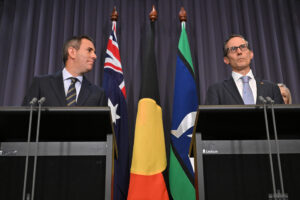Business representatives sit down today with government and others to talk about productivity. Who, according to those business representatives, will need to change the way they do things?
The elephant in the room is that it is business that has the biggest influence on productivity. Certainly, it has a much bigger impact than workers, who typically get the blame when things go wrong.
The factor that most shapes how productive workers are, we must remember, is the technology they work with. It is management that is responsible for the decisions about what technology a business introduces, and how. Workers often do not have much of a say.
It is not workers who make the decisions about how much money is available for investment. It is not workers who make the decision about which particular technologies to buy, install and use. It is not workers who decide how much money should be allocated to the training of workers to use the new technology, or how those workers should be deployed. It is management.
Sure, there is lots of evidence that, when workers have a say at work, productivity is higher. But managers often don’t give them a chance to have more than a token say, if they have any say at all. Any attempts by governments to legislate that workers decide or influence decisions on those matters are opposed by business bodies in Australia.
How much effort workers put in to their job also shapes productivity. But lazy workers don’t last long in jobs these days, and most restrictive work practices went out the window in the 1980s. If a business continued to use workers who do not put effort into their job, the finger would very quickly be pointed at the managers who decided to do that and to not have the performance management systems that would overcome that problem.
Some characteristics of workers do make a difference, but they are often still matters in the hands of management to control.
Output will be better with an educated and skilled workforce. If people can do more things with their brains, they will be more productive. Yet management decides on the qualifications demanded of successful applicants for jobs. Management decides how much pay to offer to attract qualified workers to apply for and fill skilled vacancies. Management decides on the training provided to workers.
Management decides on job quality which, studies show, is positively related to performance.
Management decides on how much a business pursues diversity, equity and inclusion practices, which (despite shenanigans in the US) have also been shown to benefit innovation and firm performance.
So it’s no surprise that a couple of years ago the Productivity Commission, after looking at OECD evidence, said that the “productivity gains from upskilling managers could be three times higher than for upskilling workers”.
The problem for Australia is that, overall, the quality of Australian management is not that good. One survey showed that Australia “ranks low in almost all the people management dimensions”.
The Productivity Commission commented in its 2023 five-yearly review that “managerial capability varies, but generally lags other countries” and observed that “limited management capability may be holding back Australia’s productivity growth”. It added that its consultations had “provided insights into some of the consequences for innovation of poor management capability”.
The main response by top management seems to be to pay itself more. But a study as far back as 2004 found that the average pay gap between CEO pay and average earnings was “at least three times higher than that required to maximise organisational performance”. Leaders might say they’re tied to performance bonuses, but somehow when profits go down, the formula or the base get changed, and the CEO’s pay packet is saved.
When that doesn’t increase productivity, it’s blame the unions. But that wears a bit thin when only one in eight workers is unionised these days. Or cut penalty rates, or some other aspect of workers’ pay! But lower wages just reduce the incentive to introduce new technology.
What the studies do show about the impact of workplace relations on productivity is that it’s not whether a workforce is unionised that matters, it’s the quality of relations between workers and management that counts — and that is very much in the hands of management.
After all, research shows that workers do want a co-operative relationship with management — which, despite management wishes, is not the same as acquiescing to every management whim. If their union didn’t want co-operation, the workers would quit the union. The trouble is, if management didn’t want genuine co-operation, it will just blame the workers, and up its own pay because it’s dealing with a difficult situation.
There are no prizes for expecting business to blame others for Australia’s productivity problems. But an honest debate would look at what management can do better.
You might also like
Australia does not have a “productivity crisis” – new research
New research by The Australia Institute reveals there is little evidence of a “productivity crisis” in Australia, despite claims to the contrary from business leaders and politicians.
Feeling hopeless? You’re not alone. The untold story behind Australia’s plummeting standard of living
A new report on Australia’s standard of living has found that low real wages, underfunded public services and skyrocketing prices have left many families experiencing hardship and hopelessness.
Go Home On Time Day 2025. As full timers disconnect, part timers are doing more unpaid overtime
New research by the Centre for Future Work at The Australia Institute has revealed a disturbing new twist when it comes to unpaid overtime in Australia.


